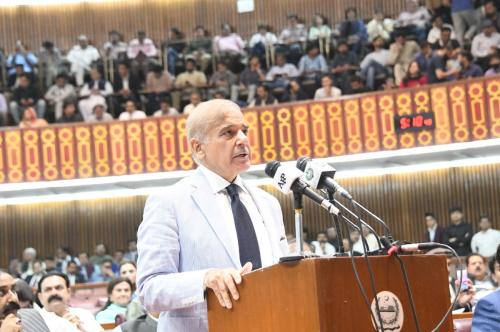On April 8, Brookings Fellow Madiha Afzal and Fahd Husain, columnist and political commentator for Pakistan’s Dawn newspaper, discussed the implications and future of Pakistan’s government following the Supreme Court decision to allow a vote of no confidence to proceed against Prime Minister Imran Khan. The conversation was moderated by Brookings Senior Fellow Michael O’Hanlon.
 MADIHA AFZAL(@MadihaAfzal)
MADIHA AFZAL(@MadihaAfzal)
Fellow, Center for Middle East Policy, Center for Security, Strategy, and Technology:
I think there still is a lot of work to be done in order to solidify Pakistan’s democracy. But at this moment one can say yes, the constitution has been prevailing in its letter. Pakistan’s civilian governments always spend their time in power with this threat of political instability, with the opposition being out to oust them… they spend their time in power … putting out political fires, if you will, rather than engaging in governance … reform and meaningful institutional change that the country so desperately needs.
 FAHD HUSAIN (@fahdhusain)
FAHD HUSAIN (@fahdhusain)
Columnist and Political Commentator, Dawn:
Yesterday was a very a big and a very significant day in terms of the Supreme Court judgment because before that, frankly, there was a fall of depression because of the blatant way that the government of Prime Minister Imran Khan violated the constitution. It was seen as a brazen attempt to bypass the basic requirements of the constitution… The last couple of days there was a lot of confusion, ambiguity, and fear that we [Pakistan] were sliding into a very dangerous fail in our politics. But yesterday’s decision not only turned this confusion into clarity, but it also made it clear that any deviation from the constitution was not permitted.
The Brookings Institution is committed to quality, independence, and impact.
We are supported by a diverse array of funders. In line with our values and policies, each Brookings publication represents the sole views of its author(s).









Commentary
Pakistan’s political and constitutional crisis
April 8, 2022